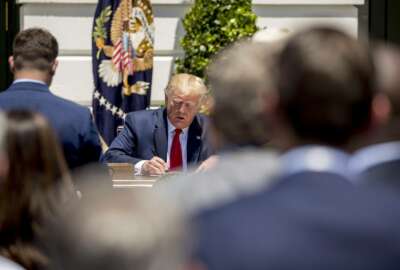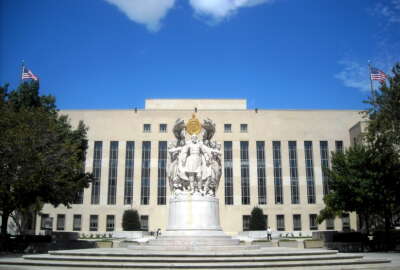
Government asks appeals court to immediately enforce workforce executive orders
US attorneys asked the U.S. Court of Appeals, which last week overturned a lower court's 2018 decision to invalidate key provisions of the president's three wor...
Government attorneys Tuesday evening asked the U.S. Court of Appeals to immediately allow agencies to enforce the provisions of the president’s three workforce executive orders.
“The government respectfully requests that the court immediately issue the mandate, so that the President’s subordinates may implement the executive orders’ lawful goals and directives and thereby generate the concrete bargaining disputes necessary to bring plaintiffs’ claims before the Federal Labor Relations Authority,” the attorneys wrote in their motion to expedite a mandate in this case.
The U.S. Court of Appeals for the District of Columbia Circuit last week overturned the August 2018 decision from a federal district court, which had initially invalidated nine key provisions of President Donald Trump’s executive orders on collective bargaining, official time and employee removals.
The appeals court dismissed the 2018 decision because, as the three judges argued, the lower court lacked jurisdiction in ruling on an initial legal challenge from a group of more than a dozen federal employee unions.
But the appeals court hadn’t formally lifted the injunction on the workforce executive orders, meaning agencies couldn’t begin to implement the terms of the EOs, if they hadn’t already through recent bargaining negotiations.
The initial ruling appeared to give federal employee unions some time to challenge the decision from the three-judge panel, which the American Federation of Government Employees, National Treasury Employees Union and other plaintiffs on the case have said they will do.
Plaintiffs have 45 days to issue a petition for a rehearing or petition to review by a full appellate panel.
“The three-judge appeals court decision last week was based on a threshold jurisdictional determination, not the merits of our argument that the executive orders clearly conflict with existing law,” Tony Reardon, president of the National Treasury Employees Union, said Wednesday morning in a statement to Federal News Network. “We plan to ask the full appellate court to review that decision.”
Government attorneys on Tuesday argued the court’s delay in lifting the injunction on the president’s workforce executive orders is having an immediate impact on collective bargaining negotiations currently happening now at the Office of Personnel Management and departments of Veterans Affairs, and Housing and Urban Development.
Because the injunction hasn’t been lifted, agency officials involved in collective bargaining negotiations haven’t been able to rely on the workforce executive orders as the basis to, for example, set the goal of finishing ground rules negotiations within six weeks or complete negotiations over actual bargaining proposals within six months, the government attorneys argued.
Related Stories
“The injunction also has practical effects on agency negotiators beyond its prohibitions,” government attorneys wrote. “The injunction creates uncertainty for agency negotiators who, as a matter of independent judgment and discretion, may wish to take the same course that had been required by currently-enjoined provisions of the executive orders.”
OPM, according to the government’s motion, has reached an impasse with its union while the injunction has been in place.
“Absent relief from this court, there is a risk that the [Federal Service] Impasses Panel may resolve those remaining disputes and bring an end to the collective bargaining process before the agency will have had the opportunity to negotiate or take positions before the Impasses Panel free from the restrictions of the injunction that this court has already unanimously held must be vacated,” the government attorneys said.
In the meantime, NTEU said it plans to file written arguments next Friday reflecting its opposition to the government’s most recent motion to expedite.
“The federal court’s injunction of major provisions in the President’s executive orders trampling the rights of federal employees should remain in place as long as this entire issue is pending in court,” Reardon said.
The National Federation of Federal Employees on Wednesday also reiterated their opposition to the government’s latest motion.
“NFFE plans to vigorously oppose the governments flimsy attempt to hasten this denial of rights to federal workers,” the union’s associate general counsel, Suzanne Summerlin, said.
Copyright © 2024 Federal News Network. All rights reserved. This website is not intended for users located within the European Economic Area.
Nicole Ogrysko is a reporter for Federal News Network focusing on the federal workforce and federal pay and benefits.
Follow @nogryskoWFED






